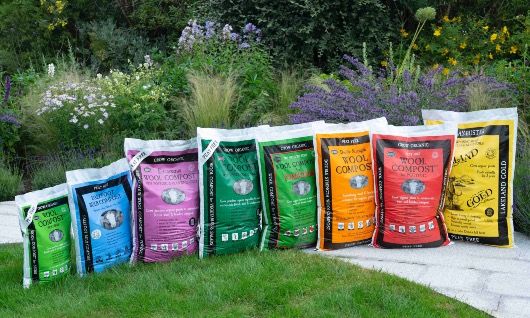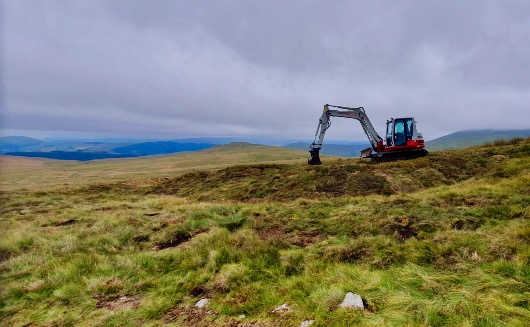
Dalefoot Composts is upping the environmental stakes by measuring how well the ingredients in its peat-free composts store carbon, as well as identifying the most eco-friendly way to restore a damaged peat bog.
The Lake District company is using 21st century science to work out the environmental benefits of the traditional ingredients in its ‘old recipe’ gardening products. Teaming up with the University of Cumbria, it is investigating how much carbon is being stored by comfrey, a key ingredient in its peat-free compost range.
Researchers are using ground penetrating radar to carry out the work on the comfrey crop, which is grown at Dalefoot Farm and then mixed with bracken and sheep’s wool to create the company’s unique composts. With its extensive root system, comfrey is renowned as a dynamic accumulator plant, tapping into beneficial nutrients deep underground. Knowing how much carbon it stores will enable Dalefoot Composts to share the carbon saving this carbon capture crop can yield.
In a UK-first, Dalefoot Composts’ sister company, Barker and Bland Ltd – a leading peatland restoration contractor - is also working with the University of Cumbria to pinpoint the best methods to restore peat bogs. UK peatlands are our largest terrestrial store of carbon, and when healthy, store up to 20 times more carbon than trees. However, many have been devasted by peat harvesting, including for horticulture, and now release carbon into the atmosphere rather than storing it.

The Government has been investing millions in repairing these precious landscapes, to halt the emission of carbon through erosion – but little thought has been put into how eco-friendly each restoration technique is or how it contributes to achieving a functioning, sequestering peatland.
Professor Jane Barker, MD of Barker & Bland and Dalefoot Composts, said: “People are now beginning to question where their gardening materials, plants and composts come from, which is great news, and with the imminent Government ban, peat-free compost is finally becoming the norm. At Dalefoot, we have always pioneered climate-friendly horticulture by making peat-free composts, whilst at the same time, restoring peatlands – a 360 degree approach to eco-conscious gardening.
“But we’ve noticed that on some restoration projects, led by other organisations, imported materials such as coir, lime and fertiliser are being used, and helicopters are then used to fly thousands of tons of these ‘alien’ materials to these remote sites as convention. We are confident our methods of using specialist equipment lighter than a human footprint and a ‘whole bog’ approach to restoration are much more environmentally effective. With this new research, we will be able to scientifically-prove the carbon footprint of our projects, something that has never been done in the UK before.”
The peatland research project is being led by Dr Simon Carr of the University of Cumbria and Professor Barker with funding from Innovate UK, the country’s national innovation agency. In another exciting project, research will also be undertaken into using wool in peatland restoration.
Dalefoot Composts is renowned for its premium composts made from sheep’s wool, bracken and comfrey. A carbon capture crop, comfrey is grown on a commercial scale at Dalefoot Farm in the Lake District and harvested up to four times a year. The company sources bracken from Wales, as well as locally in Cumbria – helping a diversity of farming communities and local landscapes.
This unique mix of fully-traceable, natural, fertilising ingredients provides slow-release nutrition for plants, so no need to feed, whilst also reducing the need to water. Dalefoot’s entire range, which includes composts for potting, bulbs, seeds, vegetables, tomatoes, clay-busting and a double strength, is Soil Association-approved for organic growing. Its Wool Compost for Potting benefits from endorsement by the world-renowned Eden Project.